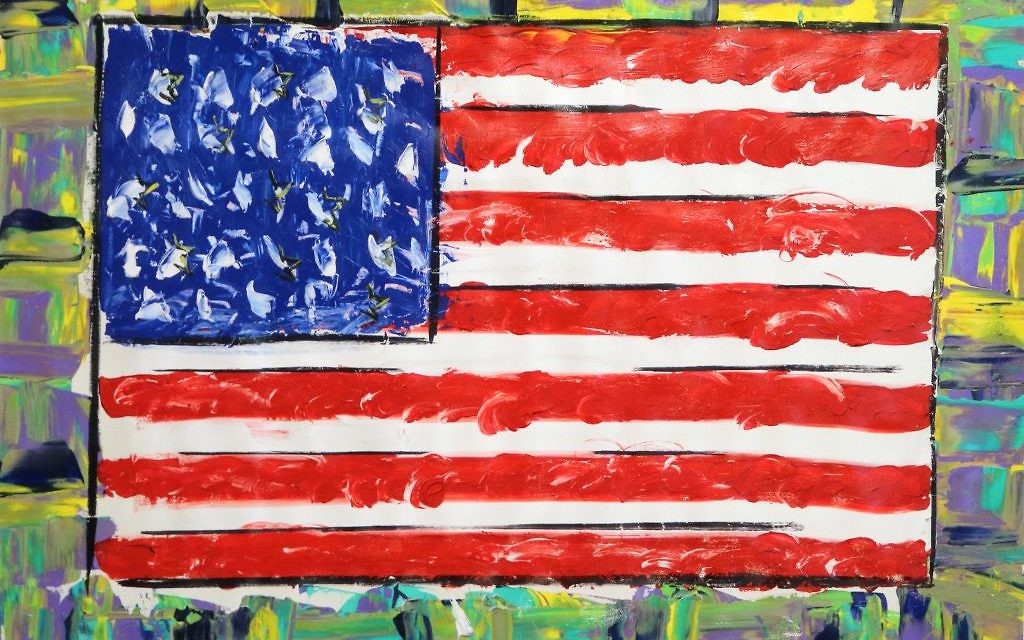Paul Stanley’s Art Was Made for Lovin’
The Kiss frontman is bringing a show of his paintings to Atlanta on June 16.
Rock musicians who paint are plentiful. Joni Mitchell, Ronnie Wood, Bob Dylan and Ringo Starr are some of the more accomplished ones.
Paul Stanley, 66, the driving force behind Kiss, is getting respect as an artist and commands hefty sums for his artwork. He is on a showcase tour coming to the Wentworth Gallery on Saturday, June 16. He spoke to the AJT from his home in California.
AJT: How is your art tour so far?
Stanley: It’s amazing. It’s humbling to see the success I’ve had, and it’s far beyond anything I anticipated. It’s terrific, validating and very gratifying.
Get The AJT Newsletter by email and never miss our top stories Free Sign Up
AJT: You had some training early on, didn’t you?
Stanley: I went to the High School of Music & Art (in New York) and had the dubious distinction of failing art. I’m not a very good follower, and I don’t take well to instruction. We certainly never painted much, and I didn’t really delve into painting until 16, 17 years ago, and that was all on my initiative and without any guidance.

AJT: You said in an interview that you’re fearless of color.
Stanley: I can’t imagine what there is to be afraid of. For me, it’s about celebrating life. Life should be vibrant, and I paint vibrantly, which is the way I feel. Doesn’t mean that life is not difficult. It just means the rewards for the difficulties make it worthwhile.
AJT: You’ve been called a punk impressionist.
Stanley: I should live up to that — a great combination of terminology. I won’t argue with it and will accept it.
AJT: You were raised Jewish, right? Your mother’s family escaped Germany?
Stanley: Yes. They fled Berlin to Amsterdam and left everything behind, as many did if they were lucky enough to get out. They had the same situation repeat itself in Amsterdam and made it out to America.
AJT: Tell us about your acting work.
Stanley: I was in “Phantom of the Opera.” I was asked to audition in New York, and they sent me to Toronto, where I played the final Phantom of the 10-year run. It would be important to note that the last thing they needed was some bozo to come in and ruin a billion-dollar franchise. They put me there because they felt I belonged, and standing ovations every night must have agreed.

AJT: You wrote an autobiography as well.
Stanley: That was three or four years ago. A New York Times best seller translated into six languages. My second book is nearly complete. It’s an extension of the first and almost serves as a manual of how I applied certain principles in my life and how other people can also. I’m not here to preach, but I can provide some insight into how I succeeded, and that’s really the premise of the book. Also, it seems that I didn’t drop dead after the first book, so there’s more to tell.
AJT: Can you explain your advocacy of wounded veterans?
Stanley: We sometimes forget that freedom is only free for those who don’t have to pay the price. We tend to take for granted that this is the land of the free and the home of the brave, but it’s the brave who keep us free. So I think it’s very important for all of us in any capacity to support our military. Politicians come and go; it’s the military that historically has not only saved us, but saved other countries. They volunteer and go in harm’s way in the name of freedom for this country. I feel that most of those returning veterans don’t receive what they should and tend to get what the government feels obligated to give them as opposed to what they deserve. These are proud people with families and in need of all kinds of assistance.

AJT: What do you want to achieve with your art show?
Stanley: In general, I just enjoy the idea that my shows are incredibly successful not just because of the familiarity with Kiss, but beyond that, it’s serious collectors who may not even like or know my band but are acquiring serious pieces. It’s all a treat. Someone might come into the gallery who has been too intimidated to experience art, and I want to reassure them that their likes and dislikes don’t need to be qualified by an education in art. You like what you like, and that’s what makes it valid. No excuses. Good art is what you collect; bad art you don’t. Good food you swallow; bad food you spit out.
Who: Paul Stanley
What: Art showcase
Where: Wentworth Gallery, Phipps Plaza, 3500 Peachtree Road, Buckhead
When: 5 to 8 p.m. Saturday, June 16
Admission: Free; RSVP to phipps@wentworthgallery.com or 404-233-0903





comments